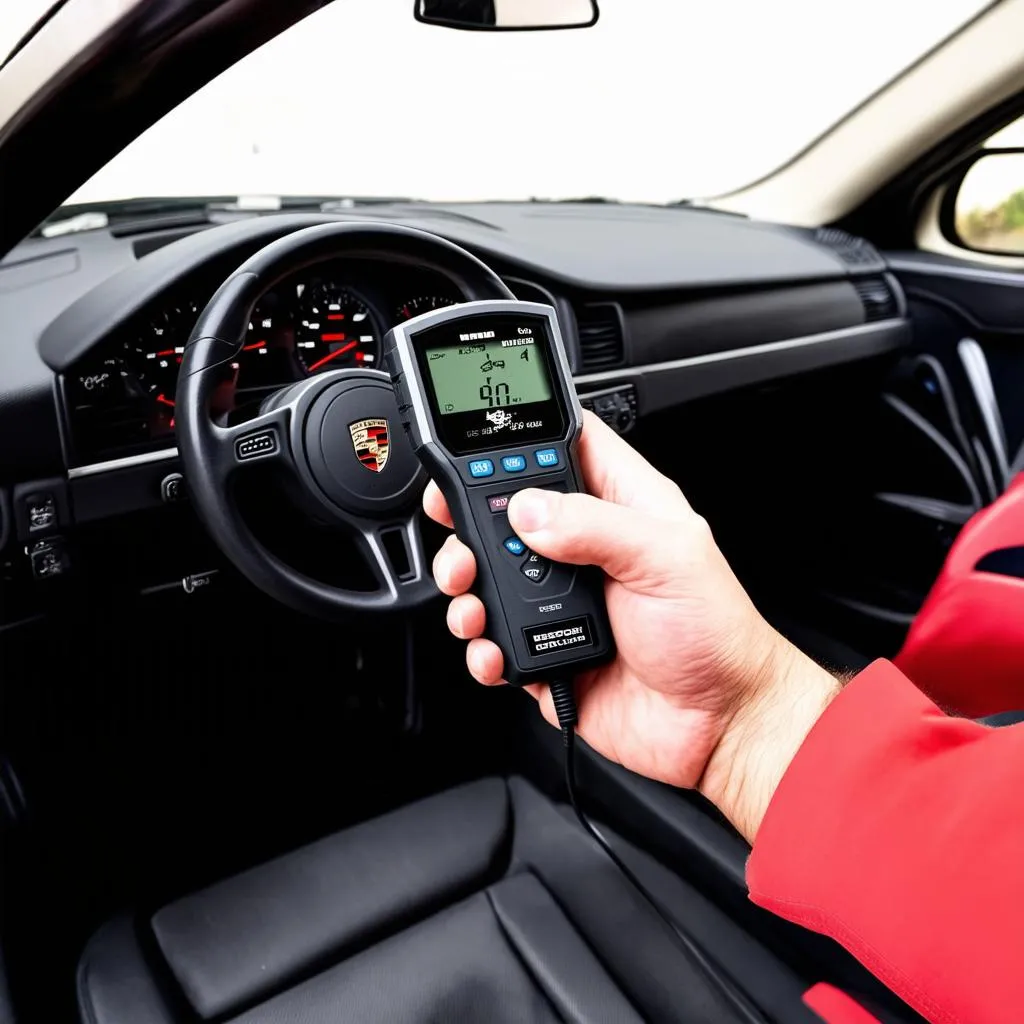Imagine this: you’re cruising down the Pacific Coast Highway in your sleek Porsche 911, the wind whipping through your hair, when suddenly, a yellow light flashes on your dashboard. The dreaded “Check Engine” light. You feel a knot of worry in your stomach. What does it mean? Is your beloved Porsche about to turn into a very expensive paperweight?
Before you panic, remember this: that little light doesn’t spell doom. It’s simply your Porsche’s way of communicating, speaking to you through a secret language of “Porsche OBD-II codes.” Understanding these codes can empower you to address issues head-on, potentially saving you time, money, and unnecessary stress.
Deciphering the Language of Your Porsche
What Exactly are Porsche OBD-II Codes?
OBD-II, or On-Board Diagnostics, is a standardized system found in most cars manufactured after 1996, including your prized Porsche. It acts as a window into your car’s various systems, monitoring everything from engine performance to emissions control.
When your Porsche detects a problem, it generates an OBD-II code, a unique combination of letters and numbers, and stores it in the car’s computer. Think of it as a digital mechanic leaving a note that says, “Hey, something seems off with the (insert car part here), you might want to check it out.”
Why Should You Care about Porsche OBD-II Codes?
Some people might tell you to ignore the “Check Engine” light, especially if the car seems to be running fine. But just like ignoring a small crack in your windshield can lead to a bigger problem down the road, neglecting those cryptic codes can have serious consequences.
Early detection is key. By understanding what those codes mean, you can address minor issues before they escalate into major (and expensive) repairs. Plus, knowing what you’re dealing with gives you a better understanding of what to expect when you do take your Porsche to a mechanic.
Common Porsche OBD-II Codes and What They Mean
While the specific codes and their meanings can vary slightly depending on the model and year of your Porsche, here are a few common ones you might encounter:
- P0171 and P0174: These codes indicate a lean fuel mixture, which could be caused by anything from a vacuum leak to a faulty oxygen sensor.
- P0420 and P0430: These codes suggest a problem with the catalytic converter, an essential component of your Porsche’s emissions control system.
- P0300, P0301, P0302, etc.: These codes signal a misfire in one or more cylinders, often caused by faulty spark plugs, ignition coils, or fuel injectors.
This is just a small sample; there are hundreds of potential Porsche OBD-II codes.
How to Read Porsche OBD-II Codes
To access these codes, you’ll need an OBD-II scanner. These handy devices, available for purchase or sometimes even loan from auto parts stores, plug into a port usually located under the driver’s side dashboard. Once connected, the scanner will display the stored codes, along with their descriptions.
 Porsche OBD-II Scanner
Porsche OBD-II Scanner
Tips for Dealing with Porsche OBD-II Codes:
- Don’t Panic: Seeing a “Check Engine” light doesn’t automatically mean your Porsche is about to break down.
- Read the Codes: Use an OBD-II scanner to retrieve the codes and understand what they mean.
- Research: Look up the codes online or consult a repair manual to learn more about the potential causes and solutions.
- Prioritize: While some codes indicate minor issues, others require immediate attention. If you’re unsure, it’s always best to consult with a qualified Porsche mechanic.
- Regular Maintenance: Keeping up with your Porsche’s scheduled maintenance can help prevent many issues that trigger these codes in the first place.
The Spiritual Side of Car Troubles
While we often focus on the technical aspects of car repair, some car enthusiasts believe there’s a spiritual element at play. In various cultures, cars are seen as extensions of their owners, reflecting their personality and even their energy.
Some believe that car problems, like those indicated by OBD-II codes, can be a sign of imbalance or blockage in other areas of life. While this might seem like a far-fetched concept, it’s an interesting perspective to consider. Perhaps a sudden influx of car troubles is a sign that it’s time to slow down, re-evaluate priorities, or address unresolved issues in other aspects of life.
Need More Help with Your Porsche?
We understand that dealing with car problems can be stressful. If you’re feeling overwhelmed or need assistance with your Porsche’s OBD-II codes, don’t hesitate to reach out to our team of experts. You can connect with us via Whatsapp at +84767531508 for 24/7 support. We can help you diagnose the problem, recommend a reputable Porsche mechanic in your area, and even provide guidance on choosing the right diagnostic tools for your needs.
 Porsche Mechanic Working
Porsche Mechanic Working
Keep Your Porsche Running Smoothly
Remember, your Porsche is more than just a car; it’s a statement, a passion, a dream come true. By understanding its language, staying proactive with maintenance, and addressing issues head-on, you can keep your beloved Porsche running smoothly for years to come.
Interested in learning more about Porsche diagnostics or other automotive topics? Explore our website techcarusa.com for a wealth of information and expert advice. You might also find these articles helpful:
Don’t forget to share your own Porsche stories and experiences in the comments below!